| Paul Robeson: Favorite Songs | |
|---|---|
 | |
| Studio album by | |
| Released | 1959 |
| Label | Monitor |
| Review scores | |
|---|---|
| Source | Rating |
| Billboard | Positive ("Spotlight" pick) [1] |
Paul Robeson: Favorite Songs is a studio album by Paul Robeson, released on Monitor in 1959. [2]
| Paul Robeson: Favorite Songs | |
|---|---|
 | |
| Studio album by | |
| Released | 1959 |
| Label | Monitor |
| Review scores | |
|---|---|
| Source | Rating |
| Billboard | Positive ("Spotlight" pick) [1] |
Paul Robeson: Favorite Songs is a studio album by Paul Robeson, released on Monitor in 1959. [2]
The album was originally issued in 1959 as a long-playing record, catalog numbers MP 580 (mono) and MPS 580 (stereo). [1] [2]
Robeson is accompanied by Alan Booth on piano (except where indicated).
| No. | Title | Writer(s) | Comments | Length |
|---|---|---|---|---|
| 1. | "Hammer Song" | with Sonny Terry, harmonica, Brownie McGhee, guitar | ||
| 2. | "Water Me from the Lime Rock" | |||
| 3. | "Scandalize My Name" | arranged by H. T. Burleigh | ||
| 4. | "Jacob's Ladder" | |||
| 5. | "Witness" | arranged by Lawrence Brown | ||
| 6. | "Stand Still, Jordan" | |||
| 7. | "Takin' Names" | |||
| 8. | "Swing Low, Sweet Chariot" |
| No. | Title | Writer(s) | Comments | Length |
|---|---|---|---|---|
| 1. | "Hassidic Chant: Kaddish" | arranged by J. Engel | ||
| 2. | "Wanderer" (Finnish folk song) | arranged by Selim Palmgren | ||
| 3. | "Songs My Mother Taught Me" | Antonín Dvořák | ||
| 4. | "Vi azoi lebt der keyser" (Yiddish folk song) | Lawrence Brown, piano Sung in Yiddish | ||
| 5. | "The Minstrel Boy" (English ballad) | words by Thomas Moore | ||
| 6. | "The Orphan" | Modest Mussorgsky | Sung in Russian | |
| 7. | "Zog nit keynmol" (Song of the Warsaw Ghetto) | arranged by Lawrence Brown | Sung in English and Yiddish | |
| 8. | "Joe Hill" | Earl Robinson and Alfred Hayes |
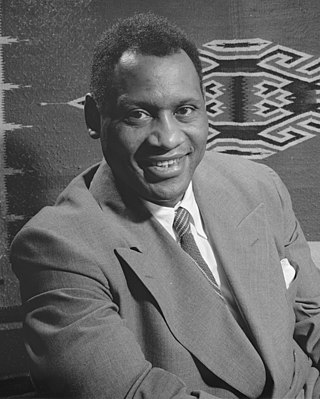
Paul Leroy Robeson was an American bass-baritone concert artist, stage and film actor, professional football player, and activist who became famous both for his cultural accomplishments and for his political stances.

The "March of the Volunteers", originally titled the "March of the Anti-Manchukuo Counter-Japan Volunteers", has been the official national anthem of the People's Republic of China since 1978. Unlike previous Chinese state anthems, it was written entirely in vernacular Chinese, rather than in Classical Chinese.

Paul Laurence Dunbar Chambers Jr. was an American jazz double bassist. A fixture of rhythm sections during the 1950s and 1960s, he has become one of the most widely-known jazz bassists of the hard bop era. He was also known for his bowed solos. Chambers recorded about a dozen albums as a leader or co-leader, and over 100 more as a sideman, especially as the anchor of trumpeter Miles Davis's "first great quintet" (1955–63) and with pianist Wynton Kelly (1963–68).
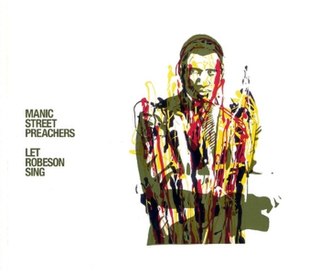
"Let Robeson Sing" is a song by Welsh alternative rock band Manic Street Preachers. It was released in September 2001 by record label Epic as the fourth and final single from their sixth studio album, Know Your Enemy. It reached number 19 in the UK Singles Chart.
"The Skye Boat Song" is a late 19th-century Scottish song adaptation of a Gaelic song composed c.1782 by William Ross, entitled Cuachag nan Craobh. In the original song, the composer laments to a cuckoo that his unrequited love, Lady Marion Ross, is rejecting him. The 19th century English lyrics instead evoked the journey of Prince Charles Edward Stuart from Benbecula to the Isle of Skye as he evaded capture by government soldiers after his defeat at the Battle of Culloden in 1746.
"Ol' Man River" is a show tune from the 1927 musical Show Boat with music by Jerome Kern and lyrics by Oscar Hammerstein II, who wrote the song in 1925. The song contrasts the struggles and hardships of African Americans with the endless, uncaring flow of the Mississippi River. It is sung from the point of view of a black stevedore on a showboat, and is the most famous song from the show. The song is meant to be performed in a slow tempo; it is sung complete once in the musical's lengthy first scene by the stevedore "Joe" who travels with the boat, and, in the stage version, is heard four more times in brief reprises. Joe serves as a sort of musical one-man Greek chorus, and the song, when reprised, comments on the action, as if saying, "This has happened, but the river keeps rolling on anyway."
Here I Stand may refer to:

"Ballad for Americans" (1939), originally titled "The Ballad for Uncle Sam", is an American patriotic cantata with lyrics by John La Touche and music by Earl Robinson. It was written for the Federal Theatre Project production, Sing for Your Supper that opened on April 24, 1939. Congress abolished the project on June 30, 1939. The "Ballad of Uncle Sam" had been performed 60 times.
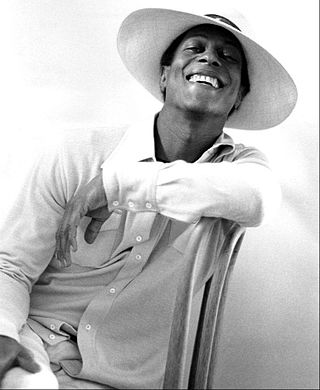
Leon Bibb was an American-Canadian folk singer and actor who grew up in Kentucky, studied voice in New York City, and worked on Broadway. His career began when he became a featured soloist of the Louisville Municipal College glee club as a student. He lived in Vancouver, British Columbia, Canada, after 1969.

"Old Black Joe" is a parlor song by Stephen Foster (1826–1864). It was published by Firth, Pond & Co. of New York in 1860. Ken Emerson, author of the book Doo-Dah! (1998), indicates that Foster's fictional Joe was inspired by a servant in the home of Foster's father-in-law, Dr. McDowell of Pittsburgh. The song is not written in dialect.
"The Wayfaring Stranger", Roud 3339, is a well-known American folk and gospel song likely originating in the early 19th century about a plaintive soul on the journey through life. As with most folk songs, many variations of the lyrics exist and many versions of this song have been published over time by popular singers, often being linked to times of hardship and notable experiences in the singers' lives, such as the case with Burl Ives' autobiography.

"Waterboy" is an American traditional folk song. It is built on the call "Water boy, where are you hidin'?" The call is one of several water boy calls in cotton plantation folk tradition.
"Rockin' Chair is a 1929 popular song with lyrics and music composed by Hoagy Carmichael. Musically it is unconventional, as after the B section when most popular songs return to A, this song has an A-B-C-A1 structure. Carmichael recorded the song in 1929, 1930, and 1956. Mildred Bailey made it famous by using it as her theme song. Like other 1920s standards, "Rockin' Chair" relied on the stereotypes of minstrelsy, citing "Aunt Harriet" from the anti-Uncle Tom song "Aunt Harriet Becha Stowe" (1853).
"Kevin Barry" is a popular Irish rebel song recounting the death of Kevin Barry, a member of the Irish Republican Army (IRA) who was hanged on 1 November 1920. He was 18 years old at the time. He is one of a group of IRA members executed in 1920–21 collectively known as The Forgotten Ten.
"Joe Hill", also known as "I Dreamed I Saw Joe Hill Last Night", is a folk song named after labor activist Joe Hill, which was originally written in poem by Alfred Hayes and composed into music by Earl Robinson in 1936.

"Were You There (When They Crucified My Lord)" is an African-American spiritual that was first printed in 1899. It was likely composed by enslaved African Americans in the 19th century.
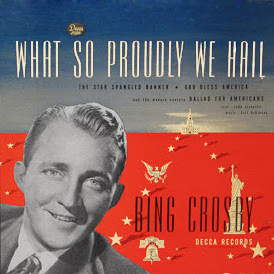
What So Proudly We Hail is a compilation album of phonograph records by Bing Crosby released in 1946 featuring songs that were sung by Crosby in an American-type patriotic style. This album featured Bing singing patriotic songs such as: "Ballad for Americans", "God Bless America" and "The Star-Spangled Banner". The songs were later presented in a 33 1/3 rpm split set with The Man Without a Country.

"We'll Keep a Welcome" is a popular song composed by Mai Jones with lyrics by Lyn Joshua and Jimmy Harper in 1940. It was introduced in the BBC radio variety show Welsh Rarebit and remains strongly associated with Wales.
The following is the discography of American singer Paul Robeson.
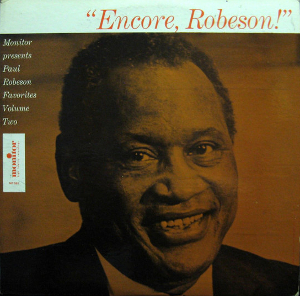
"Encore, Robeson!", subtitled Paul Robeson: Favorites, Vol. 2, is a studio album by Paul Robeson, released on Monitor in 1960.